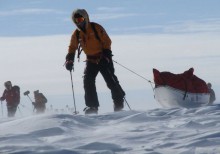The National Antarctic Research Center of Ukraine holds a solemn farewell ceremony for Ukrainian expedition to the distant continent every March. Their predecessors come home somewhat later. It has been this way for 19 years, since Ukraine got the “Akademik Vernadsky” station as a gift from the UK and started conducting research activities there. However, this year, when the 20th expedition had to depart, everything could go wrong. As late as few days ago, the Antarctic Center was anxious about whether Ukraine would be able to return the 19th expedition home, send the next one in, and pay for the ship’s charter, because the budget funds allocated to it were not enough for the task. Let us recall that Ukraine does not own an Antarctic-capable ship, so it has to charter a foreign ship every time. This year, the charter cost 1,400,000 euros.
“The Antarctic program funding provided for by the state budget was allocated in full. However, as the station is located on an island and lacks airport, it can be reached only by a ship in the short navigation period. When the exchange rate jumped, it turned out that even with the program fully funded, there was no money for the charter. This put at risk all our activities in Antarctica from start to finish,” deputy minister of education and science Maksym Strikha told the press.
“SOME PEOPLE IN THE GOVERNMENT DO NOT THINK THAT UKRAINE NEEDS TO KEEP PRESENCE IN ANTARCTICA”
The issue was settled literally at the last moment. The researcher did not elaborate on the details of the talks, only hinted that such a decision was hard to reach, even though preserving the Antarctic presence of Ukraine was included in the coalition agreement. That is, there was a risk of the government failing to abide by this commitment. According to Strikha, losing that presence is unacceptable, despite the difficult economic situation.
“Quite a few people in the government did not believe we needed to keep this Antarctic presence at all. It is important because Antarctica holds a majority of the world’s fresh water, huge stocks of biological resources, mineral resources, and if economic development of Antarctica ever starts (which is possible), states that are members of the Antarctic club will occupy their zones. It is important that we do not lose this opportunity, and it has to do not only with modern science, but with the economic interests of our country as well. In terms of science, we are part of the large world science community, what we do is very important, and our station is a uniquely favorable spot in Antarctica for research. It is best suited to explore the fluctuations of the edge of the ozone hole and study the effects of global warming on glacier melting and biodiversity,” Strikha argued.
He also told the press how our scientists reached the distant station. They come there by a ship which is usually taking so-called Antarctic tourists to the ice continent. The scientists have just a few days when the island can be reached, and they perform all loading operations in these days. Ukraine charters a ship which buys inexpensive food and fuel on the way as it enters cheapest Latin American ports. The deputy minister stressed that thrift was very important there. The scientists themselves come to the area by plane, change to ship in the far south of Argentina or Chile and reach their destination. We describe this route for a reason, as we aim to show the real picture of sadly insufficient funding for science in Ukraine, even though our potential is extremely high.
“WITH THE TITLE OF AN ANTARCTIC NATION AND A MISERLY BUDGET”
The current budget for the Antarctic Center is 33.2 million hryvnias instead of planned 37.3 million. Even the latter sum stands at just two-thirds of the real need. The Cabinet of Ministers is to propose amendments to the state budget by February 15, 2015, so this figure should rise. Still, how are the Antarctic station and the research center in Kyiv to function when the money is still sorely lacking? The center’s press attache Volodymyr Bochkariov said that the station’s equipment was obsolete as it had not been replaced for a long time, but buying new items was impossible. Our “Akademik Vernadsky” remains the only station in Antarctica without an Internet connection of its own. It is absurd in the world of modern technology. The Kyiv center has purchased an antenna, but it has been out of work for six months, because there is no way to deliver it to the glacier. The center’s employees are not sure that they will be able to do it even with the 20th expedition departing.
“We try to find solutions by cooperating with other scientists, turning to our foreign colleagues who have the required equipment and inviting them to come to our station. They provide us with equipment while we create working conditions for them. Still, we do research and need funding. We have something to tell and show, our scientists have developed theories with many applications in pharmacology, medicine, ecology, but they are not implemented because of the funding shortfall,” Bochkariov summed up.
The 20th expedition will not depart at full strength, as it will have only 12 people instead of usual 15 to 17. There will be no seasonal research team, that is, the scientists who work during the shift change, as it will include only the wintering team. Still, the scientists are relieved to see that it was possible to find even this solution, leaving them with a miserly budget, but Ukraine with the title of an Antarctic nation. However, they need far more attention from the state, and perhaps the public as well.







